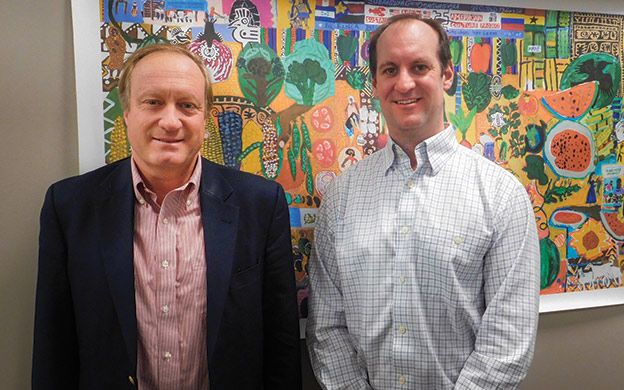On the record: CEI Ventures pursues socially responsible investments
 Photo / Lori Valigra
Nathaniel Henshaw, president and managing director, (left) and Chandler Jones, principal, at CEI Ventures Inc., a Brunswick-based, socially responsible investor that requires companies it invests in to meet benchmarks for job creation and preservation of the environment.
Photo / Lori Valigra
Nathaniel Henshaw, president and managing director, (left) and Chandler Jones, principal, at CEI Ventures Inc., a Brunswick-based, socially responsible investor that requires companies it invests in to meet benchmarks for job creation and preservation of the environment.
Nathaniel Henshaw, president and managing director of CEI Ventures Inc., looks to invest in companies with a social mission, those that are environmentally conscious or that have a good percentage of lower income jobs. In fact, those wanting its money have to sign an agreement saying they will work with parent CEI both to create job opportunities for low- to moderate-income candidates and to undergo an environmental review and aim for improvement.
The for-profit, wholly owned subsidiary of nonprofit CEI of Brunswick, has so far created or retained more than 3,600 jobs, 2,000 of which are net new jobs, over its 50 company investments in Maine and elsewhere. Henshaw recently talked about his investment strategy with Mainebiz. An edited transcript follows.
Mainebiz: What are the criteria for socially responsible investments?
Nathaniel Henshaw: We have an interest in the environment, so we've invested in Pika Energy [in Westbrook], a solar and wind inverter company. We're also interested in local and natural food, and we've invested in Maine Craft Distilling [in Portland]. The companies we invest in have to sign a social agreement. Our target is for them is to create 60% or better low- to moderate-income jobs. That means if they hire 100 people, about 60 of the jobs should be low- to moderate-income. They also should be full-time, year-round jobs with benefits.
MB: You just closed your fourth fund in January. Can you run through each fund and tell us the largest exit by a Maine company?
NH: We were incorporated in 1994. Our first fund, CVLP, started in June 1996 and invested $5.5 million in 20 companies. The most profitable exit was Coast of Maine, in which we invested $260,000. It was bought by Gemini Investors of Wellesley, Mass., for an undisclosed amount last year. That fund is still open, but we're waiting to collect the last escrow.
Our second fund, Coastal Ventures II LLC, is a $20 million fund started in March 2001 that has invested in 17 companies. Our largest Maine exit was RecruiterNet of Portland. We got eight times back what we invested.
The third fund, Coastal Ventures III LP, was started in March 2011 and is a $10 million fund with 12 investments. It's half way through its life span so we've only had four exits so far. On average our funds run 10 years, sometimes a little longer. The largest Maine company exit was geographic information system software company PenBay Solutions of Brunswick.
And the fourth fund, Coastal Ventures IV LP, was started in December 2015 [and closed January 2017]. It's a $10 million fund with three investments so far, including Maine Craft Distilling in Portland's East Bayside area, and no exits.
MB: When you raised your fourth fund, 17 local and regional banks and eight individual investors capitalized it, along with a $1.5 million anchor investment from your parent, CEI. With the general venture capital trend of larger funds making larger investments, is it difficult for smaller funds like yours to raise capital?
NH: Fundraising for smaller firms isn't as robust. So, yes, it's harder for us. We almost always invest in convertible preferred stock or debt with warrants. In general, the companies and markets for equity tend to be smaller in Maine. Our investments range from $250,000 to $2 million, with the average around $500,000 through multiple financings.
MB: Do you like to lead or follow when investing?
NH: We're happy to lead, follow or get out of the way. We work a lot with the Maine Venture Fund in the same small market and with the same Maine employment goals. We often work with Rand Capital and SVIC of New York. And with SJF Ventures, a sustainable jobs fund headquartered in Durham, N.C. We also invest a lot with Maine Angels, and have done some deals with Advantage Capital.
MB: Have there been any surprises along the way?
NH: When we were planning our first fund, CVLP, we didn't expect a big surge in internet investments, but five of our 20 deals were internet investments. We invested in RedZone Wireless, but we've since sold it.














Comments